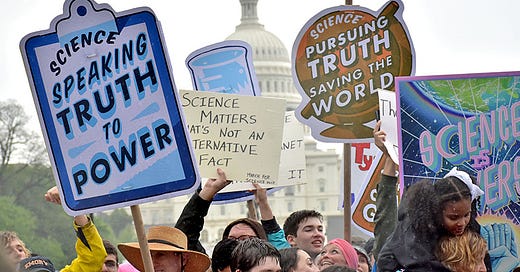Speaking Truth to Power on Climate
This opinion piece is part of my series on "The Next Economy: Business, Energy & Sustainability in Transition"
As the effects of climate change accelerate, precise language is one of the most important tools we have to understand the crisis—and respond to it. Yet across the U.S., efforts are underway to dilute or erase the very words that make this crisis salient to science, policy, and the public.
Figure 1. Scientists have moved beyond neutrality to activism, and sometimes into public office to defend the role of science in society. Amaury Laporte/Flickr (CC BY-NC 2.0).
It’s not just policy rollbacks. Under the current administration, climate programs have been defunded, environmental regulations reversed, and international commitments abandoned. But just as troubling is the attempt to erase the vocabulary of climate from public view. Federal agencies have been advised to avoid using the term “climate change.” Researchers applying for grants have been encouraged to reframe their work using softer terms like “weather extremes” or “resilience.” University faculty have reported pressure to steer clear of language that might attract political scrutiny.
This may sound like semantics, but it’s not. Blotting out our ability to speak forcefully about climate risks does real harm. The phrase “climate change” describes a measurable shift in Earth’s systems due to anthropogenic greenhouse gas emissions. The term “climate crisis” reflects the urgency of those changes, backed by evidence from the Intergovernmental Panel on Climate Change (IPCC) and other scientific bodies. Substituting vague terms like “natural variability” or “environmental risk” muddies the science, obscures cause and effect, and weakens our ability to act strategically.
I’ve worked at the intersection of climate science, policy, and business for over two decades. I understand the temptation to soften language to maintain access to decision-makers or to avoid triggering ideological resistance. But when we downplay climate realities in our language, we also dilute the opportunity for collective action. Precision in communication is not a luxury. It’s the backbone of scientific and policy response.
This watering down of language coincides with the rise of so-called “climate realism,” a rhetorical shift gaining traction in some policy circles. Proponents of this view don’t deny that the climate is changing. Instead, they argue that it’s too late or too expensive to stop it. They suggest that mitigation is futile and that adaptation is our only option.
That argument is defeatist and distorting. The IPCC’s 2023 synthesis report shows that every tenth of a degree we can avoid makes a measurable difference in human suffering, ecosystem stability, and economic disruption. Adaptation is essential, but resigning ourselves to uncontrolled warming is neither scientifically justified nor morally acceptable.
At the same time, we’ve seen political figures like Donald Trump declare “emergencies” on issues ranging from immigration to energy to public disorder. His campaign pledges invoke national crisis language to justify sweeping executive actions—yet climate change, a scientifically validated global emergency, is rarely mentioned. This asymmetry is telling. The language of urgency is applied where it supports partisan narratives, but dismissed when it points toward decarbonization or environmental regulation.
Meanwhile, within the scientific and academic communities, there’s growing self-censorship. Faculty members edit their grant proposals to avoid certain terms. NGOs rebrand their programs to retain funding. Climate professionals moderate their speech in public forums. This cautious rewording might seem strategic, but over time it undermines the clarity and authority of climate science itself.
Effective communication doesn’t require us to be alarmist. But it does require us to be honest. Scientific language should reflect the scale, timing, and risks we face—not the political convenience of the moment. We don’t help the public by replacing “climate crisis” with “resilience planning,” any more than we’d help a patient by calling cancer a “cellular anomaly.”
Words matter—especially when they shape how we interpret evidence, design policy, and allocate resources. The terms scientists use are not just descriptors; they carry implications for urgency, accountability, and action. When language is manipulated to avoid discomfort, it becomes harder to build public understanding, harder to design effective responses, and harder to hold those responsible to account.
We recognize how important safeguarding our data is. We should treat our language the same way.
Calling climate change what it is—a global emergency—doesn’t shut down dialogue. It creates the conditions for a more honest and informed conversation. We can’t afford euphemisms with so much at stake.
In moments like this, clarity is not a stylistic choice but a civic and scientific responsibility.




